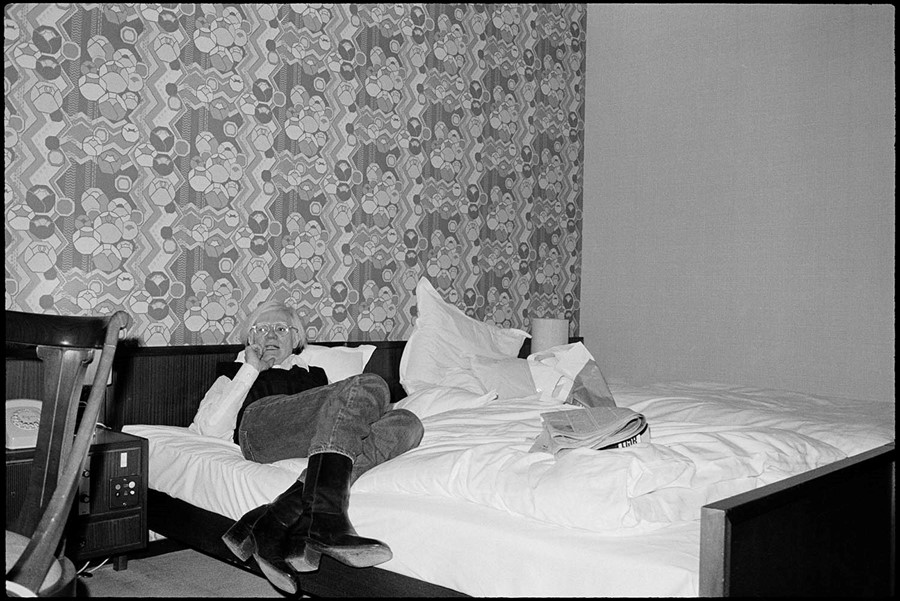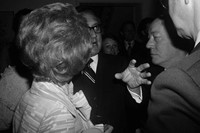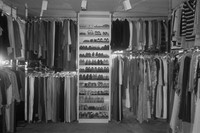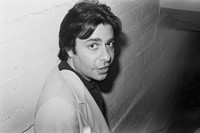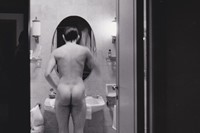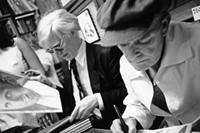With his new photography show in New York City, photographer and former editor of Interview magazine Bob Colacello remembers a different age of celebrity, art and popular culture within Andy Warhol’s orbit
Bob Colacello, the former editor of Interview magazine, approached photography the same way he wrote his stories: he wanted to give his audience a sense that they were there with him in the thick of the action. His photos reflect impromptu scenes. No one posed for him since many were unaware of his tiny, matte black Minox 35 EL Camera which could easily slide in and out of his jacket pocket. Some prints show a person’s hand covering another’s face or a voluminous hairstyle obscuring part of the composition: “I was in the party and I wanted my photos to have that feeling,” he says.
Pictures From Another Time: Photographs by Bob Colacello, 1976–82 at Vito Schnabel Gallery in New York City features the oeuvre of Andy Warhol’s close confidant – and former voice – who was attached at the artist’s hip for almost 12 years. During the latter part of his tenure at Interview, Colacello travelled everywhere with Warhol and captured candid moments. Over 150 of these prints are on display: scenes unfolding at discos like Studio 54, The White House, and hotel rooms.
Speaking to AnOther from New York City on his flip phone, Colacello shares poignant memories from his Interview days with Warhol and chats about the politicians, musicians, photographers and fashion designers he encountered from that era.
“I was 22 years old and still in graduate school at Columbia University when I got this call from the then editor of Interview, saying that Andy Warhol had just started this magazine and he had been reading film reviews I had written in the Village Voice and would like to meet me and see if I was interested in writing for their magazine. I was beside myself because for me and my generation, Andy Warhol was an icon of the 60s, rebellion and cool and up there with Mick Jagger and William Burroughs. I couldn’t believe I was working at this place where one day Mick Jagger came by to discuss having Andy do his portrait and the next day it was Governor Rockefeller who came by to look at some paintings. Then we’d have dinner at Max’s Kansas City with Candy Darling and Holly Woodlawn, these glamorous funny drag queens who were in Andy’s films.
“Andy’s attitude was like, ‘you should just do it and not think about things too much’. He believed in hard work. Everything we did including his films and even his art, there was a certain tongue-in-cheek quality. It sort of was a joke, but actually it was serious too. It just seemed to get bigger and bigger as time went on in terms of the magazine and the whole business growing. There were lots of trips to Europe because he had more museum shows and more serious collectors in Europe who were able to look at his work with some detachment that Americans couldn’t at the time because he was so much about American popular culture, consumerism and symbolism.
“Andy’s motto was ‘make it fast, easy, cheap and modern’. By modern he meant new: always try to do something that hadn’t been done before. Fast, easy, cheap and modern is also this idea that if it was taking you too long to do something and it was costing a lot of money to do something, it wasn’t the right thing for you to be doing. That sort of ethic permeated the way we worked.
“What I miss about working at Interview and the Factory was the sense of discovery. The sense that we had very little money so we used young photographers, young writers. We discovered Fran Lebowitz, Robert Mapplethorpe, and Bruce Weber. But there’s something exciting about being part of a start up.
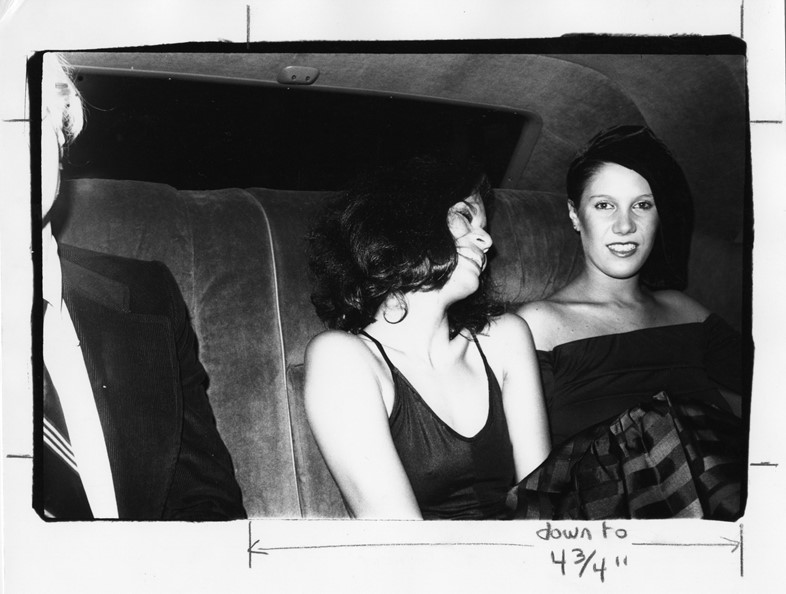
“I feel fortunate that I’ve had a life where my work and my social life have dovetailed always. Sometimes I’m walking a tightrope when you’re writing about people you know well but because maybe I could do a better job in writing about them or what I’m writing about them is more real. The reader feels like they’re getting closer to them than they would be if the same article was written by someone who was more on the outside looking in. The photographs have the same quality as my writing, my journalism.
“I wasn’t a photographer. Most of the pictures were taken at private parties and not film premieres or art openings. They were taken at Valentino’s chalet in Gstaad. Or hanging out with Andy in his hotel rooms where he’s lying on his bed and having a nap in his jeans. People didn’t pose for me. They barely noticed me taking a picture because I would take very few. I had this little Minox that was in my inside jacket pocket. There are few pictures where you have the feeling that the person is even looking at the camera.
“Oh Andy would probably say [about the show], ‘Oh gee Bob, oh wow you’re really up there now’. He would love Vito first of all because he’s young, attractive and smart and working hard since the age of 16 curating shows. He would probably be a little jealous. He would be like, ‘Vito should give me a show’. Andy would have probably been so immersed on Instagram and social media, which I’m just dipping my toe into.
“Andy and I both got these cameras on the same day in Bonn, West Germany. Andy had an exhibition in Zurich with Bruno Bischofberger, but Bruno’s assistant showed up at Andy’s hotel suite with his little Minox 35 EL. It was the first 35 millimetre camera that was really small. We looked all over Zurich and they were sold out everywhere. So when we got to Bonn where Andy was going to do Polaroids of Willy Brandt, the chancellor of West Germany, the first thing we did was check into the hotel and ask, ‘Where is the nearest camera store?’ It was two blocks away. We got two cameras: one for me and one for Andy.
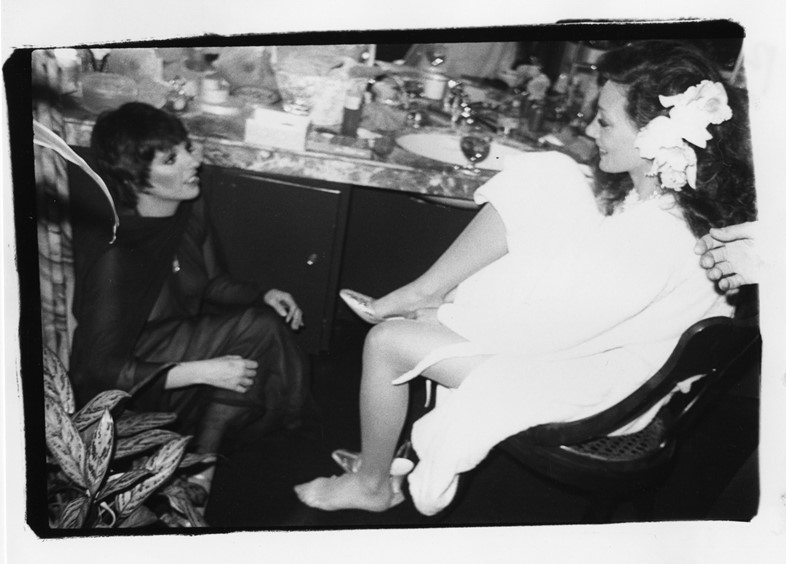
“Andy and I were not in perfect sync. I think if he were alive today and I was still editor of Interview in some weird way, he would be dating Kim Kardashian and telling me, ‘We got to put Kim on the cover’. And I would be saying, ‘Over my dead body, Andy’. I was never a yes man. I was more of a no man at the Factory but Andy liked that. Andy liked drama, intrigue, a little bit of chaos, and the 60s Factory had been pure chaos, then in the 70s he got shot. He wanted things to be more business like and more quote-unquote normal.
“Reality TV is like Andy’s early movies, where he just took very exhibitionistic people and set up a camera on the tripod and let them go. I think his influence has been for better or for worse. I think a lot of what’s going on today is scary. I think Andy would be eating it up because his basic instinct was to record and not to judge. There’s a lot to record today. Everything’s so much more public. People post their genitals online. Andy would love that. I think it’s tacky.
“I would say these photographs are a privileged look at a largely private world taken by someone who was part of the picture. I feel like everything we did at the Factory – all of Andy’s work and certainly Interview and my work was documentary: Documenting the times, documenting the people who were prominent in those times. I used to say my photographs were sort of a form of sociology. Now they seem like archaeology. So much time has gone by and it’s such a different world.”
Pictures From Another Time: Photographs by Bob Colacello, 1976–82 opens at Vito Schnabel Gallery, New York, from May 3 – June 21, 2019.
